EA Sports FC 25 review - football's fitting forever-drama continues once more
Recycle kick.
One thing I've always admired about football journalists is their ability to keep finding something new to say about what is, ultimately, the exact same game. In one sense that's just the nature of football, a sport which seems to defy all logic in its ability to create sparkling new drama from the same, enormously well-documented scenarios. But in this case I'm really talking quite specifically about a single club, in Manchester United. A club of which - sorry - I am a lifelong fan.
A slightly lesser-known fact about this club is that when you support Manchester United you also get the added bonus of an incredible amount of things to read about Manchester United. Even in international breaks and summer transfers and every waking second in between, a world's-largest fanbase and their voracious appetite means this club is across sport pages everywhere. In the past decade of post-Ferguson hinterlands, however, that coverage has taken on a particularly fascinating slant. It's typically about how Manchester United are, despite their vast wealth and popularity and history and tradition, not very good. But the interesting bit is how the conversation has changed about that not-goodness.
At first it was a kind of outraged disbelief - sack the manager, and all that - but over time that criticism and analysis became more focused on the systemic. Sporting directors, scouting networks, corporate management structures, ownership schemes. Something deeper must be going wrong, these articles proposed, some mismanagement at a higher level. They were absolutely right. But systemic change takes time - if it ever happens at all. And the fans need their daily hot takes.
Soon enough, we started getting articles about not only the problems or their systemic causes, but about how sustained those problems and causes were. Then came ones about the reaction to how sustained they were - the Gary Neville's dead-eyed "this is Manchester United" meme era. And then, somehow, something even beyond that. A reaction to the reaction itself. The meta-meta-analysis. Articles about writing articles about the reaction to the sustained causes of the problems. (And after that, erm, I suppose whatever you'd call articles like this.)
What has all this got to do with EA Sports FC 25? Well, if you've been paying attention then I suspect a lot of that sounds really quite familiar. An organisation with vast, unparalleled global popularity and which seems unshakable regardless of performance or public opinion? A household name (well, sort of, while it was FIFA)? A recent opportunity for a top-to-bottom rethink (after it got rid of FIFA)? A general sense that it's not as good as it could be, that it's a bit financially grubby, and also that all this persists both because of and in spite of a gigantic amount of fans, coverage, attention, and cash? I am Gary Neville, and this is EA Sports United.
Let's get into it then. As ever - and as it shall be forever more - this year's FC 25 contains: genuine improvements on- and off-pitch; new features of varying degrees of gimmickry and arbitrary proper nouning; a largely pointless but quite fun small-sided mini game; a deeply cynical, casino-esque engagement-bait mode; and a mostly even spread of euphoric highs and infuriating lows in the actual matches themselves. It's also, curiously, at once entirely different to FC24 - perhaps the most 'different' a FIFA/FC has felt for a while - and yet also it's exactly the same.
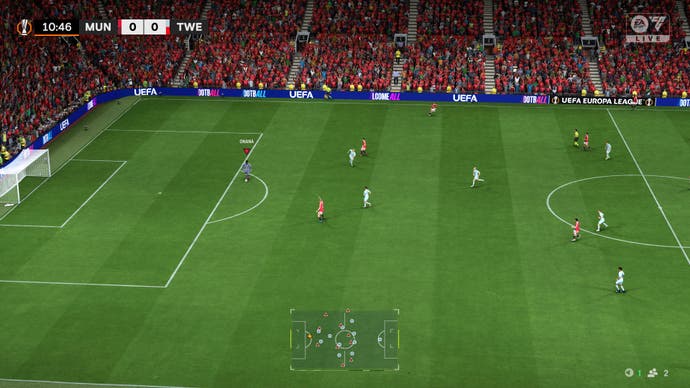
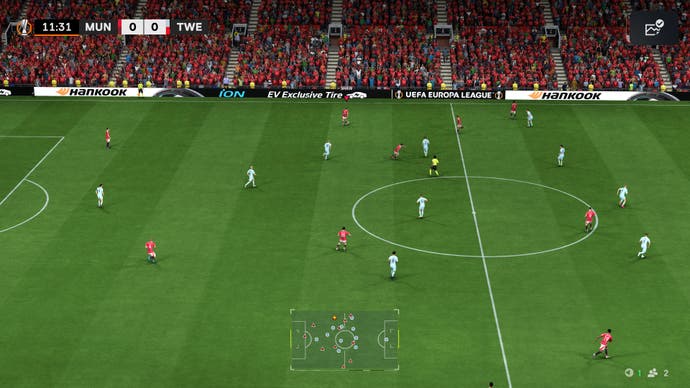
There are three big points of difference, which are probably three of the better parts of FC 25. The first, which sounds rather shallow but is in fact a pretty big deal, is the menus. FC has had terrible, laggy, outdated menus since long before it dropped the FIFA moniker, particularly in online modes like Ultimate Team. When so much of this game is played in menus - tactical tweaks, shifting between modes, chucking burner cards on the FUT transfer list or playing Squad Building Challenges or sifting through another pile of insufferable Career Mode emails - snappy, intuitive menus are genuinely important.
For the first time in as long as I can remember, this is now what they are. Minimalised and switched to a simple horizontal list and overarching dropdown, they're quick and clean. They could maybe do with a touch of colour, to help distinguish layer from sub-layer - it's still remarkably easy to get lost in the bowels, particularly with, say, Ultimate Team Objectives, of which there are more than half a dozen kinds, some with half a dozen sub-kinds between them - but otherwise, mark this one down as a tick. The menus were laggy and annoying, now they're not.
This is also doubly important because of the second big change with FC 25, which is really the biggest change of all: tactics. One of FC 25's new proper nouns, 'FC IQ', this is a fully revamped tactical and positioning system. In other words, the way you set up your team works differently, and the way they then move about and play on the pitch when out of your manual control, has been properly reworked.

Like with so much of FC 25, there are successes and failures here. The success comes in the form of increased tactical complexity and nuance, and arguably a bit of extra realism too. Players now have positions, roles, and focuses. The position is simple enough, like, say, Right Back. The role is what then governs their overall actions and goals on the pitch. A Right Back with the fullback role, for instance, behaves like a fairly classic right-sided defender; with the wingback role meanwhile they'll get forward much more often to support the attack out on the right side. Then there's their focus, which governs how offensively or defensively minded they are. Again, self-explanatory enough: attacking means they get forward and attack more, defensive the opposite, support a bit of both.
To anyone who's played Football Manager, this breakdown will be extraordinarily familiar - there, it's called positions, roles, and duties, and it's been around for a good decade-plus. Some of the names are identical in fact, including some lesser-used terms, such as Stopper and Shadow Striker, which in all my excessive tactics nerdom I'd genuinely never heard in use before they appeared in Football Manager. (FM boss Miles Jacobson clocked this, by the way, but was diplomatically flattered when I asked him about it earlier this summer).
The results are twofold. On the pitch, you now have control over some real minutiae, enabling you to get your Central Attacking Midfielder specifically drifting to the left in possession, for instance, or your fullback tucking inside. Not all of the tactical tweaks are new - a lot of this, like fiddling with whether your defenders try to jump forward and block balls into opposing attackers' feet or drop off them to mark the space, is really a rephrasing of what already existed before - but there's enough genuine novelty here for it to have a real impact.
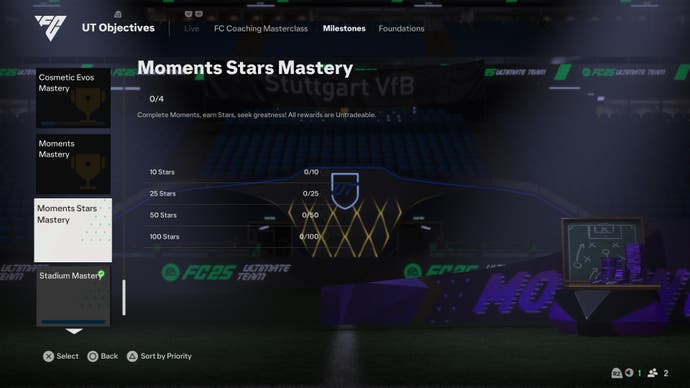
Off the pitch, the key difference is that this just means a lot more fiddling in menus if you want to really make the most of the system, and as nice and clean as those new menus are, the tactical ones are probably still some of the weakest. It takes too long to make a fairly simple positional change during in-game substitutions, for instance - not because of old lag issues but new issues of things being buried just one or two button presses too deep. It's an inherent issue with adding Football Manager-style depth, given that series was originally designed for PCs and touchscreens. An effective countermeasure here is to just use presets, which are widely available in Career Mode and dictated by your chosen manager in Ultimate Team. This does genuinely help, but then there's still a lingering sense you're missing out on some final, game-changing tweak that's just too much fiddly effort to bother setting up.
There's also another issue, in that the wider team tactics you can employ quickly make the game feel much closer to previous, pre-FC IQ versions of the game, which leads me to the third and final one of these genuinely significant changes: the feel of the on-pitch game itself.
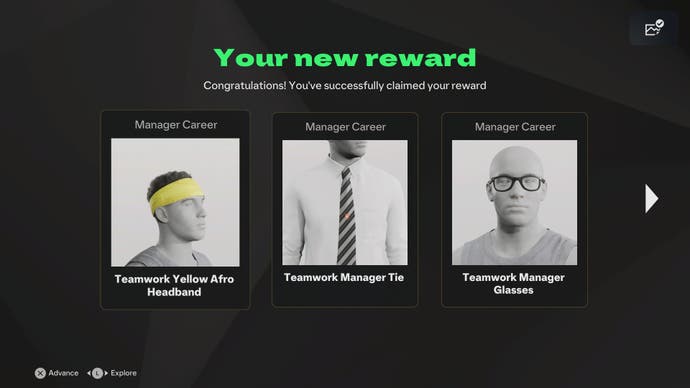
For much of my early time with FC 25, I genuinely thought this might be the best football this series has produced in a decade. There's more room for genuine football - think 'third-man runs' where a bit of combination play unlocks a path through stubborn defensive blocks - but also, more room for the arcadey touches of older FIFAs, where realism moves aside for a sillier kind of fun. Part of how that manifests is through a nice distinction between the feel of players - actually aided by the continuing use of womens' league players, often smaller but more agile or well-balanced on the ball, amongst mens' players in Ultimate Team. It's also present in the return of PlayStyles, which enable certain players to pull off, say, types of pass or dribble, better than others.
It comes to the surface best of all through the new close control dribble (from holding RB/R1), combined with other forms of dribbling at various speeds. Swapping between them gives you dramatically more influence on how you work your way up the pitch, and while it might feel 'arcadey' in how it exaggerates a certain facet of the game, it actually brings it much closer to the real thing. In the modern game, 'press resistance' has become the phrase of the moment, and it's now paramount among players across the pitch. Ultimately it means the ability to closely control the ball with such prowess that you can worm your way out of an aggressive opponent press with a smart disguised turn, quick burst of acceleration, or a bit of neat footwork. Think Frenkie De Jong and Kobbie Mainoo (fellow United fans might wince at that first name), or Mateo Kovacic, Romeo Lavia, or even John Stones. It's a reaction to the game becoming more structured - you need players who can beat that structure with pure technique - and seeing it become a key factor in FC's matches is great fun. I genuinely can't think of another time where such a demonstrably prominent part of the current real-world game appeared in this series' attempt at the virtual one simultaneously.
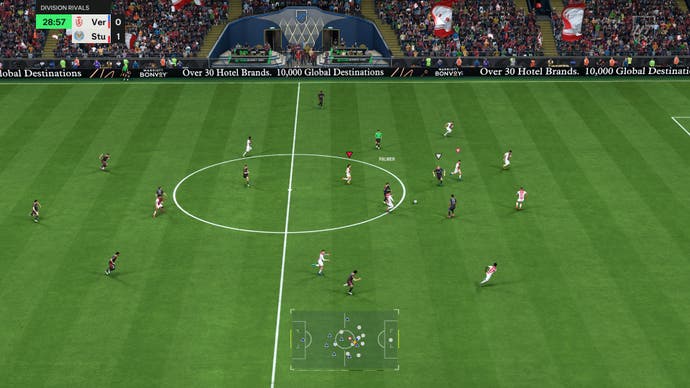
The flipside, of course, is that like so many FIFAs and FCs before FC 25, that one good thing can become excessively dominant. At lower levels of online play, it's not uncommon to see comically vast holes appear in midfield, as one bit of close control sees you glide past an entire section of the opponent for a clear run at their rapidly backing-away defensive line (and often straight through it, too).
At higher levels, it becomes a tighter case of gamified guesswork, where bluffs and counter-bluffs play out through subtle animation hints and body shapes. Are they about to go from holding R1 to switching to R2 for a sprint? Do I anticipate - since that attacker's faster than my defender - and risk opening up a massive gap by going too early if I'm wrong? Or do I hold course and risk being out-paced by not anticipating it soon enough? These decisions play out over and over, each in a fraction of a second. It's part of the joy of FC, and in some senses quite similar to the real game itself. But as you play more and more games, these patterns become more well-worn and soon enough, more tiresome. Sometimes I just want to play football, not a 30-rounds deep mind-game at the World Championship of rock-paper-scissors.
Looping all this back into tactics - sorry, FC IQ - and other old frustrations start to bubble back up to the surface. Again, at higher levels - say Division 5 of FUT Rivals and above - the same cat-and-mouse game of counter and counter-counter takes place through tactical decisions, like pressing high vs. rapid counter attacks; Stopper centre-backs vs balls in behind; narrow 4-4-2 diamonds to plug those close-dribbling midfield areas vs. overlapping fullbacks out wide (I had a lot of luck with that last one, by the way. Until the next counter of easy pinged balls to wingers in the spaces I'd left open).
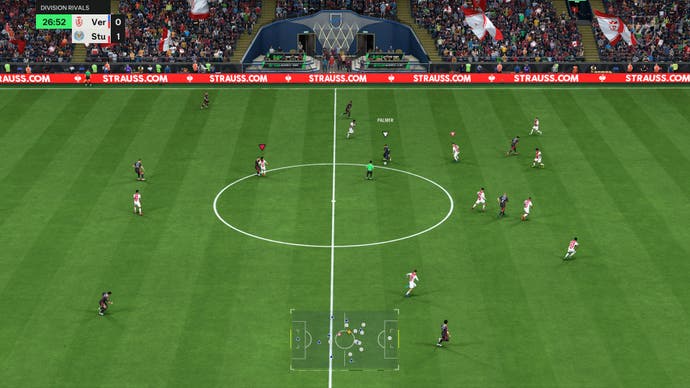
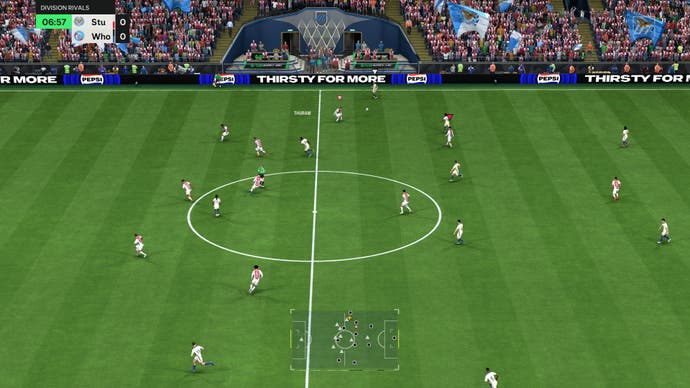
Again, in some sense this represents 'real football', going back to the wonderful old Jose Mourinho analogy of sleeping with a blanket that's just a bit too short to cover both your shoulders and your toes. There's always space left open on a football pitch. Perhaps the only issue here is that those spaces can feel a bit too open, the counters too profound, a symptom no doubt of EA Sports' construction of FC as a game of 6-minute matches, of necessarily immediate satisfaction - and therefore immediate frustration for the opposing player as a result.
Lastly, there is one ultimate, utterly infuriating sin that continues on the pitch. While player switching has been significantly improved - at least for me; it's always been highly subjective - what's somehow managed to get even worse is the inability to switch to your defensive midfielder. Controlling your CDM is the key to defensive success in FC 25, and many a FIFA before it - tracking back manually to tackle a dribbling player is dramatically more effective than trying to control a backpedalling central defender ahead of the ball. This is always lesson number one for anyone who wants to instantly get better out of possession.
I truly dislike FIFA/FC conspiracy theories, but in FC 25 it's almost like EA Sports knows this to be so important that it's made it intentionally close to impossible. More likely, it's a part of the studio's emphasis on forcing 1v1 isolated scenarios between attacker and defender which, if my multiple series press trip presentations have taught me anything, this studio remains absolutely obsessed with. It's reached the point where I've started conducting experiments in live games: I will push the analog stick directly towards my CDM and find the cursor moving in the opposite direction; or I'll start cycling through switches manually and count up to four, five, six, seven times before landing on the CDM who was right next to the ball all along. Whatever the cause, it's awful, and has been awful for far too long.
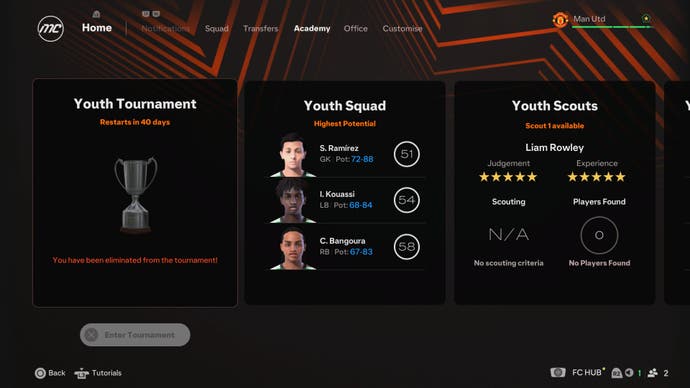
All these changes - and the successes and failures of actually creating new experiences notwithstanding - and we've not even got to the things that haven't changed much at all.
One is Career Mode, which in fairness has received a general visual zhuzh to its social media feeds and pointless Fabrizio Romanofication (as if the state of FC-inspired football dialogue wasn't bad enough) as well as some properly new features. You can now hop into live season scenarios matching the real world - like a big derby game, say, or replacing a manager at the same moment they were sacked in real life. Scouting's been improved, though I still find it relentlessly fiddly - it's much easier to just Google 'best right wingers FC 25' and manually hammer in a name to the in-game search than it is to vaguely send off a fictional in-game scout and hope for the best.
Youth football is also playable for the first time, albeit only via games of FC 25's new small-sided mode Rush (more on that shortly) when it comes to actually controlling youth players, which is slightly odd. EA Sports reckons this is because small-sided games are a key part of youth development. Which is sort of true but also, kind of totally wrong? Young players also have to learn how to pass and dribble and position themselves, just like grown ups. Nevertheless the youth nerds will get a kick out of this part of the game being visible at all.
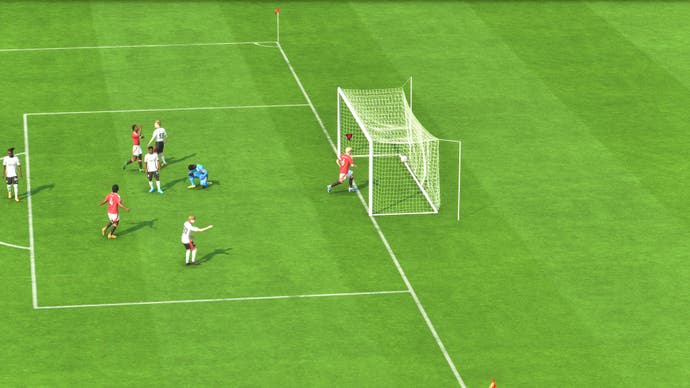
But many of my long-running Career Mode gripes also continue. Press conferences are interminable. Emails are endless - and, I cannot stress this enough, I do not clock off from my work answering emails to play my casual football game only to answer more emails. That's what FM is for! The list goes on: transfers remain ludicrous, and even less excusable: transfer negotiations are terribly dated, clunky, and slow, involving yet another overly-involved system of loading up a sans-dialogue cutscene, where slightly dodgy renders of real-world managers awkwardly sit on a leather sofa together and wave numbers at each other until one suddenly decides they've had enough. My feeling here is that if you can't voice a cutscene in your multi-billion-pound football franchise in 2024 - understandable, actually, when it involves real people - maybe just park that whole approach and do it by email, since we seem to be stuck with them anyway?
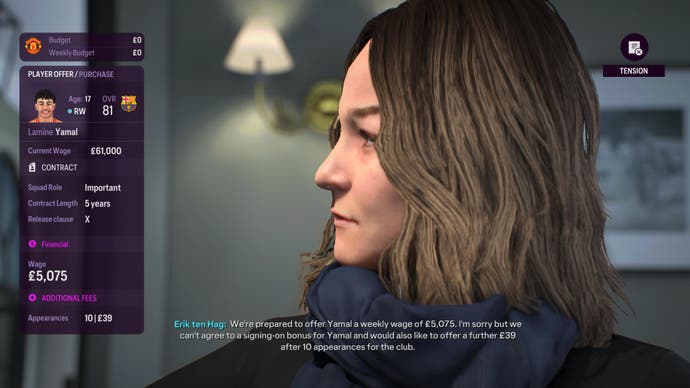

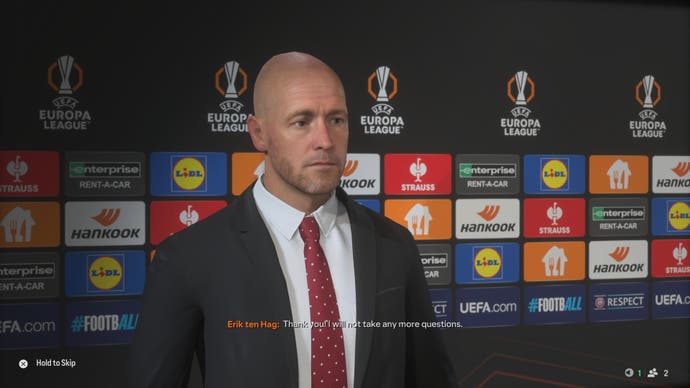
What else? There's Rush, which is actually new. In a way. Rush is Volta, only un-futsalified. In other words any semblance of tactical structure, or reality at all, is gone, that nice if somewhat vanilla acknowledgement of an underappreciated footballing subculture replaced by a monument to the instantly gratified, hype-obsessed, specifically online football culture of today. (Nothing personifies this more than the "goallllllll"-screaming MLS commentary EA Sports has brought in here. Fun the first time, less fun when your scoreline is 12-17 in a 6-minute game and he does it for each and every one).
Here's how it works. Four of you plus an AI goalkeeper sprint forwards to attack all at the same time. When you lose the ball, you (and maybe one other person who actually vaguely understands how football works) then sprint back towards your own goal. Then you eventually give up on this stubborn game of chicken with your own anonymous teammates and realise nobody else is going to defend if you don't, and so you spend the game running about in a 1-on-4 game of stop-the-counterattack like an increasingly leggy 2023 Casemiro until you realise winning isn't very fun, actually, if this is the only way to do it.
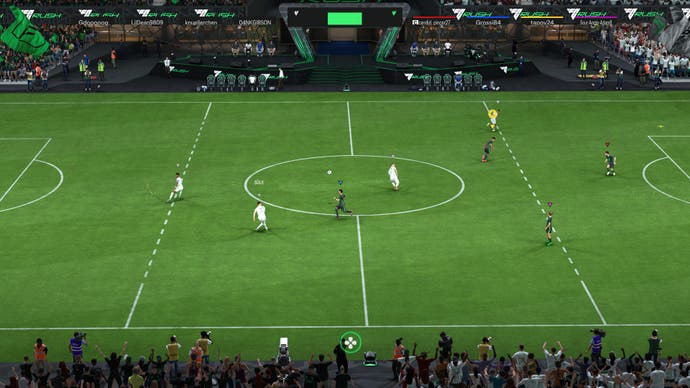
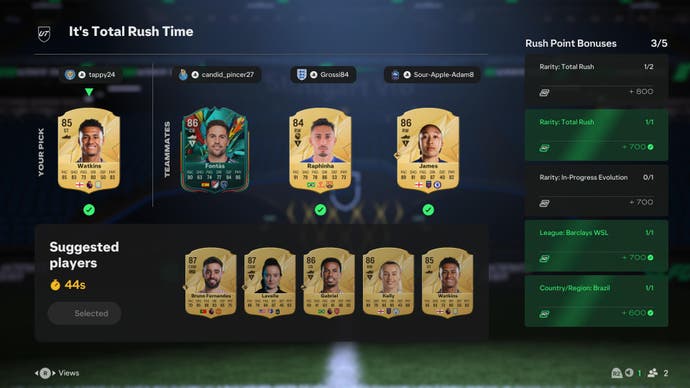
My suggestion here, to go full armchair developer, is simple enough: any small-sided game in FC should be a modern take on FIFA Street, which was openly ridiculous on purpose and also absolutely fantastic. If I'm going to be coerced into digital 5-a-side games with 11-year-olds, I at least want the ability to nutmeg David Beckam with Roberto Carlos and then kick a ball so hard it sends the goalkeeper flying through the net.
Last and absolutely least is Ultimate Team. This brings me back, finally, to that slightly laboured analogy with finding new things to say about Manchester United. What do you say about Ultimate Team today? We've talked about this at length, in previous FIFA reviews, in interviews with EA Sports monetisation chiefs and in news reports on each new attempt or failure at legislation on loot boxes as a whole. The question of whether or not EA's aggressively monetised random-chance player packs counts as gambling rumbles on - the Austrian courts ruled 'no' on that just this week - but I should emphasise something here. That question is moot. What matters isn't the legal definition, but the material impact of it.
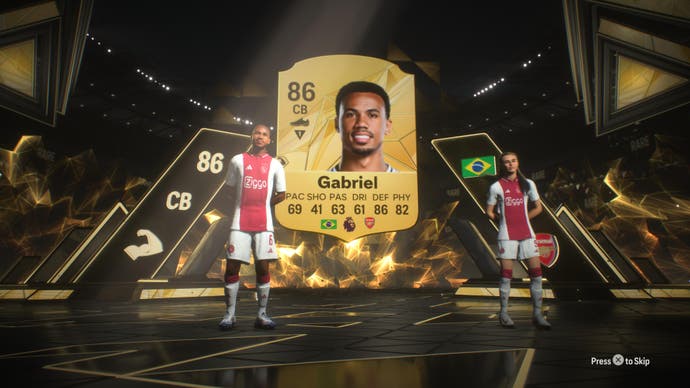
Does this feel very similar to gambling? Does it largely produce the same effects - compulsion, frustration, desperation, and deceit, in say hiding expenditure from loved ones or 'borrowing' mum's credit card? Does it employ the same techniques, in psychologically engineering that compulsion through audiovisual design, gameplay incentivisation, and product positioning? Is it just generally, in a game rated 3+, something that feels very gross? (Note that you actually need to be 16+ to register an EA account required to play online, depending on the scenario - something EA will often point to, somewhat self-defeatingly, in its defence).
Yes. Obviously. But here we are again. This is football too, ultimately: a grotesque, financially doped game that runs on corruption, desperation, obsession, oil money, and a lot of gambling sponsorships all at once, and yet remains unshakably adored, including by this writer. This is why FIFA and EA Sports' rendition of the game always made for quite good partners. This is another year of actually-quite-interesting changes, which slot in well and come with sincerely good intentions - the actual humans at EA Sports developing this game clearly, obviously, love football, for all the conspiracies and mockery and abuse that flies around after each last-minute loss that felt undeserved. It's another year of unquestionable generosity: there is just an awful lot of video game here, across FC 25's plethora of modes, seasons, and updates. And another year where the annual tweaks settle in such a way as to recreate, or reposition, the same old problems that have been here since the beginning. This is EA Sports FC 25. I love it. I hate it. It'll probably be like this forever.
A copy of EA Sports FC 25 was provided for review by EA.







